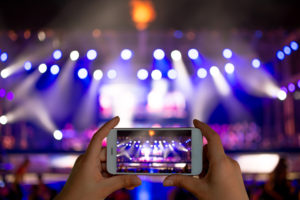4 Ways Live-Streaming Can Benefit Your Events

One of the main challenges organisers face around events is getting enough people to sign up and attend. But even when you hit your targets, there are still many out there who are interested in what your event has to offer but are unable to come for one reason or another. And this is where live-streaming comes in.
Live-streaming technology has made steady advancements over the past few years and is gaining a lot of ground in our industry. In fact, a recent Eventsforce poll found that 45% of organisations are live-streaming events to reach out to wider audiences. And the number are growing.
Let’s have a look at the top four ways live-streaming can benefit your events:
1. Reach Larger Audiences
Live-streaming what is going on at your conference to people that cannot be at the physical location does help you reach a larger audience. After all, there is only so much that a physical venue can accommodate without running into capacity and Health & Safety issues.
New eBook: The Event Planner’s Guide to Personalisation
One association has been live-streaming their annual conference for a number of years now. Their membership base spreads to several thousand around the world, yet the number of people who come to the physical event is always limited to around 1,000 delegates. By live-streaming their conference sessions, the association is successfully engaging with all the other members who are unable to attend the event. Also, through tracking their remote delegate stats, they have a better understanding of what type of sessions work best and which topics and speakers are most popular.
2. Create New Revenue Opportunities
Delegates that attend paid-for events understand the value of the admission price. After all, there is usually food and beverage available, then you have the networking opportunities and of course speakers need to be paid. Yet many organisers struggle with the idea of charging registration fees for remote delegates. Of course, it could be argued that remote delegates will not be able to enjoy the food and beverage or networking. But they are still able to access all the great and valuable content your event offers in terms of educational and knowledge sessions.
Don’t forget that people are a lot more used to paying for content online these days. The only thing you need to do is set a level of pricing that is easy to understand and keeps a difference between those delegates that attend physically and those that participate remotely. Most registration systems like Eventsforce can help you create personalised registration journeys for different types of attendees (in this case, remote and live audience) – so you can easily decide which registration questions, agendas, sessions, prices and packages are going to appear to which attendee.
3. Drive More Attendee Engagement
Using a dedicated online host can help you drive more engagement with your remote attendees. They can be your main link or conduit with this audience and can provide important commentary, updates and reminders about your event and sessions. By representing the needs and interests of your remote audience, they can also conduct interviews with though-leaders, speakers and other delegates. The host can also be used to introduce pre-recorded video content and manage dedicated Q&A sessions.
4. Increase Sponsorship Opportunities
Whether you decide to charge for your events or not, live-streaming can open up other revenue opportunities for you through sponsorship. The beauty of sponsoring live-streamed sessions of course is that after the event, the on-demand recording of the session can be made available to be played time and time again. This is great news for your sponsors and can provide them with a more quantifiable return on investment (ROI).
You can approach your event’s existing sponsors and offer them the opportunity of having their brand in front of a remote audience as well. For an extra fee of course. Or you could approach new sponsors and offer just the ‘live-streaming’ sponsorship option. You could also break down all your live-streamed sessions and target specific sponsors per session.
Conclusion
Live-streaming your event means heavy reliance on technology. Will it go wrong? Well it could. But then so could any technology. Every time you take a flight on a plane, step aboard a driver-less train or make a bank transfer you are putting yourself in the hands of technology. It is no different.
Related article: 7 Mistakes to Avoid When Using Facebook Live at Events
Companies specialise in providing livestreaming technology and they remain in business because they are constantly developing improvements to make sure nothing falls over. It is not in their interest for your event to have a problem. Trust in the technology and the providers of it. But to give you peace of mind, run through all the questions you have about failures, performance indicators and back up plans. The providers will be happy to answer all your questions.
Did you enjoy reading this article? Get weekly updates from our EventTech Talk blog for tips, updates and research reports on all the latest marketing and technology trends shaping the events industry today.
